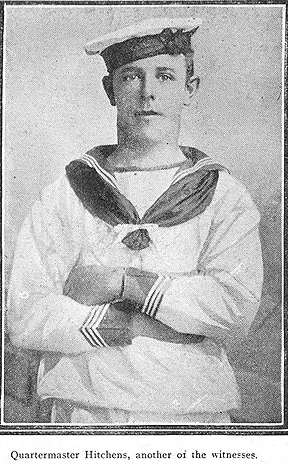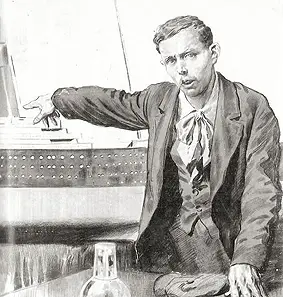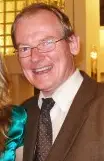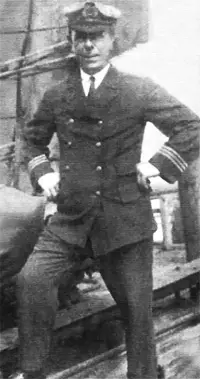Robert Hichens
Quartermaster

“I was sent down to take charge of No. 14 boat, but before I went one of the officers had shot himself on the bridge..."
29 year old Robert Hichens was one of six Quartermasters aboard Titanic and was the man literally at the wheel at the time of the collision. At the time of the disaster he gave his home address as 43 St James Street (St. Marys, Southampton), he lived there with his wife and 2 children (8.). During the port side evacuation Second Officer Lightoller put Hichens in charge of lifeboat no.6 which departed with only 28 aboard although a capacity of 65.
Robert Hichens' own conduct aboard lifeboat no.6 would later come under scrutiny after female passengers claimed he lay uselessly huddled in blankets, drinking whiskey and refusing to return to the Titanic to rescue others.

A young Robert Hichens.
Photograph: Senan Molony/Mirror
(Click image to enlarge)
One who publically accused Hichens of drinking was Major Arthur Godfrey Peuchen, a Titanic survivor who was in lifeboat no.6 of which Hichens was put in charge. Major Peuchen, in a Saturday 20 April 1912 edition of The Toronto World said: "Our sailor in charge had also got at some brandy and was incapable. So we had no provisions."
Another occupant of lifeboat 6, Mrs Lucian Philip Smith (Mary Eloise Hughes), 18, from Huntington, West Virginia, although not naming him, spoke of a "drunken sailor" which clearly seems to indicate Hichens. She said: "“This lifeboat was permitted to be lowered with but one sailor in it and he was drunk. His condition was such that he could not row the boat and therefore the women had to do the best they could in rowing about in the icy waters." (The Denver Post, April 19, 1912:)

Hichens: 'Mrs. Mayer accused me of drinking all
the whisky, which I deny, sir'
(Click image to enlarge)"
1st Class passenger Mrs Leila Meyer (née Saks) also inflamed Hichen's anger when she suggested that he was drunk, swore and took blankets in a newspaper interview.
On Day 5 of the United States Senate Inquiry Robert Hichens publically defended these accusations, stating: "Mrs. Mayer [Meyer], she was rather vexed with me in the boat and I spoke rather straight to her, and she accused me of wrapping myself up in the blankets in the boat, using bad language, and drinking all the whisky, which I deny, sir." (25.)
Hichens also on Day 5 made a further statement to clarify: "I would like to make a little statement as regarding Mrs. Mayer's [Meyer] statement in the newspapers about my drinking the whisky sir, and about the blankets. I was very cold, sir, and I was standing up in the boat. I had no hat on. A lady had a flask of whisky or brandy, or something of that description, given her by some gentleman on the ship before she left, and she pulled it out and gave me about a tablespoonful and I drank it." (25.)
It has been claimed that Hichens went to South Africa a year or two after the Titanic sinking and became Harbourmaster at Cape Town, although research has shown that he never in fact held any such senior position (please refer an article on this here). However claims that Hichens had a great secret to reveal about his time aboard Titanic eventually led to the discovery of two Irish newspaper articles about the helmsman by Senan Molony, the Political Editor for the Irish Daily Mail in Dublin. The first interview was published in the Leitrim Observer on Saturday July 29, 1933:
WHEN THE ICEBERG
STRUCK.
_______
Thousand Ghosts of the Titanic’s
Steersman.
________
“MONEY DID NOT COUNT.”
________
A Press representative met a man recently who is haunted by a thousand ghosts.
He is Robert Hichens, the man at the wheel, when in April 1912, the Titanic struck an iceberg and foundered in mid-Atlantic.
“Money didn’t buy life that night,” Hichens told the representative.
“One thousand four hundred and ninety people were swept to death.
Nine millionaires, together worth £140,000,000 perished. Money did not count.”
Robert Hichens is roaming the ports of Britain, down and out.
Although he has thirty years’ experience behind him, he is one of 12,000 Merchantile [sic] Marine officers searching for work.
He then told the representative the story of the greatest shipping disaster in history.
“On the night of April 14, 1912,” he said, “I had to take the wheel of the Titanic from 10 p.m. to midnight. It was a cold, calm night. We were making 22½ knots.
I was due off in half an hour when the gong on the bridge sounded three times - ‘Something ahead.’
The man in the crow’s nest had sighted the iceberg.
Mr Murdock [sic], the first officer, gave me the order ‘Hard a starboard.‘ I flung the wheel over. A few seconds later, at 11.40 p.m., the ship struck. The whole boat suddered [sic]. Then I heard the plates ripped away as the iceberg passed down the side.
The ship took a list. There was a sudden silence on the bridge.
Captain Smith rushed up."
“I was sent down to take charge of No. 14 boat, but before I went one of the officers had shot himself on the bridge.
There were about forty people in my boat.
We had gone only 500 yards from the ship when she sank.
It was a moment I shall never forget. The skies and heavens were pierced by a thousand shrieking voices, a wailing cry of terror that rose and rose... then silence.
After a few minutes the boat officers began calling to each other across the water.
But that cry of a thousand lost souls echoed in my ears. I hear it still, and shall hear it until I die.”
(Leitrim Observer, Saturday July 29, 1933, p. 7, reprinted courtesy of Senan Molony)

Senan Molony
Senan Molony has written an article entitled "Robert Hichens in the Hungry Thirties" published in the Titanic Historical Society's "The Titanic Commutator" edition No 202, for the 2013 2nd quarter issue, in which he analyses the article. He states:
"Its real significance may lie in mention at the end of an alleged officer suicide on the Titanic. This late assertion, which Hichens never made before, certainly not at the 1912 inquiries or in any public manner, marks out the former man at the wheel at the time of the iceberg impact as the most senior ranking crewman to subscribe to such an occurrence."
Molony also notes a discrepancy with other more familiar suicide accounts, noting that, according to Hichen's statement that the suicide happened "before I went" to lifeboat no.6, "this would be relatively early in the night, when standard lifeboats are still available." He also notes that since Hichens has already mentioned Murdoch in his account, but then states simply "one of the officers" that "this tends to suggest that it was one of the remaining officers, other than Murdoch... or surely he would have referred to the same man again." (The Titanic Commutator edition No 202, 2013)
Hichens did not mention a suicide during the inquiries, however he did say the following at the British Inquiry:
Br. 1328. All the officers had revolvers, as far as I am aware of, Sir.
Br. 1330. These revolvers—were they used at all? — I heard several reports, Sir, but, as regards anything else, I do not know.
Br. 1331. You simply heard? — I heard the reports of the revolvers—yes, Sir.

Robert Hichens in later life.
Molony believes the above answer "may be a defensive admission. Gunshots were fired, but he would rather not discuss them. Perhaps he did actually know more, and is trying to preclude further questioning. He was not pressed on the point. This may be a pity, in retrospect, as Hichens conveys the impression that he has more to tell." (The Titanic Commutator edition No 202, 2013)
There is also a second article discovered by Molony, published in The Kerryman of May 11, 1935. His assessment is that it is "most probably a ‘recycling’ of the 1933 material by the original journalist. Perhaps he knew that Hichens was safely in prison... in any case, it is far too florid to have likely come unaided from the pen of the former Titanic quartermaster." (The Titanic Commutator edition No 202, 2013)
This second article does not reference an officer suicide directly but at the end of the article states the following:
"Of those who survived the disaster, some have died through shock, some have committed suicide because of the hell they went through, and there are some who were killed - mercifully, perhaps, for them - in the Great War." (The Kerryman, Saturday May 11, 1935, p.1)
Molony references this in his conclusion to the Commutator article:
"Finally, of course, we have again an echo of suicide. These last interviews of Hichens (who died in 1940) suggest he had no intention of revealing a navigational or helm error as the cause of the Titanic foundering. His big secret, if it ever existed, may have been confirmation of an officer’s self-despatch, a claim that has been around since the earliest. No judgement is passed on the value of what Hichens now appears to reveal. It is noted, however, that thus he becomes the most senior member of crew (and the only one on duty at the time of impact) to ever assert that an officer took his own life." (The Titanic Commutator edition No 202, 2013)
Verdict: